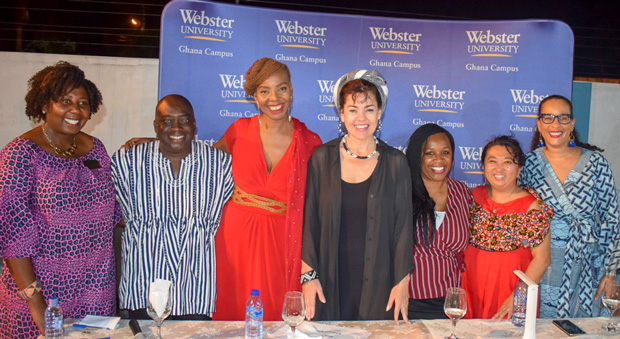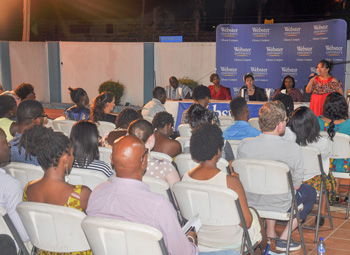Webster Ghana: #MeToo from African Perspective
April 24, 2018

The discourse and global outcry against gender discrimination and abuse, culminating in the #MeToo movement, was brought front and center at the 9th public lecture held at Webster Ghana on the theme, "Breaking the Silence: An African Perspective on #MeToo."
A panel of three Webster University lecturers at the Ghana campus—Yolanda Spies, Esther Armah and Mike Boakye-Yiadom, as well as Funke Baffour, a prominent psychologist—explored this theme extensively, sharing their experiences from their unique fields of expertise. Agnes Khoo-Dzisi, head of the Department of International Relations at Webster Ghana, served as moderator for the event.
As panelists shared their research and personal experiences, it became clear how relevant the #MeToo movement is within Ghana and Africa given the prevalence of sexual discrimination and harassment and violence found in schools, professional settings and homes. Panelists were unanimous in their assessment that in order to confront the challenges facing the Ghanaian society, all members of society must come together and develop a movement that takes into account the often unique cultural challenges faced by women in Ghana and Africa.

stakeholders have in actively dealing with the issue
"We have strength in numbers and it's not just about the female voice; it's also the male voice," Baffour said.
Additionally, Spies cautioned that the only way Africa can level the playing field along gender lines is to see the problem as "#UsToo.” This led to a heated debate between the audience and the panelists concerning the roles of major stakeholders in dealing with the issue and how people can get actively involved.
The powerful role of the media, and how some reporters have diminished the significance of #MeToo within an African context, was also discussed. Armah urged media practitioners in Ghana to specifically "frame the narrative and tell the story correctly in order to make maximum impact.”
As a way of lending support to victims and survivors, Baffour provided a resource list containing information on counseling centers and government agencies focused on women’s rights across the country. Armah also recognized the emergence of a few targeted social movements, including #TimesUpGH, which is aimed towards stopping sexual abuse in schools.
The program was considered groundbreaking as the topic had not been fully addressed in such a public forum before. The event attracted significant numbers including feminist groups, selected high school and university students, counselors, educators, media representatives, diplomats and the public at large. Contributions from the discussion were tweeted as well as live streamed throughout the evening.
